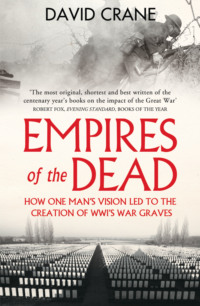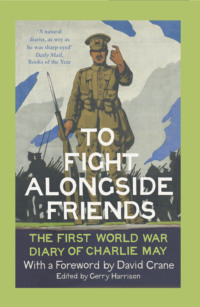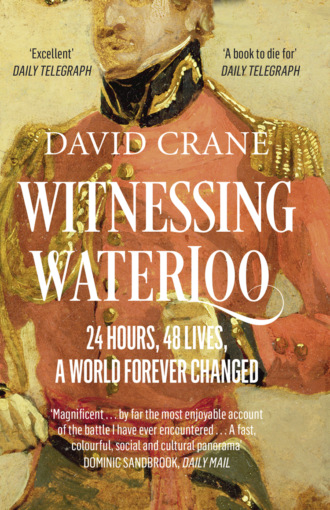
Полная версия
Witnessing Waterloo: 24 Hours, 48 Lives, A World Forever Changed


Copyright
William Collins
An imprint of HarperCollinsPublishers
1 London Bridge Street
London SE1 9GF
WilliamCollinsBooks.com
This eBook first published in Great Britain by William Collins in 2015
First published in Great Britain as Went the Day Well? Witnessing Waterloo by William Collins in 2015
Copyright © David Crane 2015
David Crane asserts the moral right to
be identified as the author of this work
A catalogue record for this book is
available from the British Library
Cover image: Studies of Royal Horse Artillery Uniform, and of an A.D.C. to the Commander in Chief: a study for ‘The Battle of Waterloo’ (oil on board) by Jones, George (1786–1869), Yale Center for British Art, Paul Mellon Collection, USA/Bridgeman Images.
All rights reserved under International and Pan-American Copyright Conventions. By payment of the required fees, you have been granted the non-exclusive, non-transferable right to access and read the text of this e-book on screen. No part of this text may be reproduced, transmitted, down-loaded, decompiled, reverse engineered, or stored in or introduced into any information storage retrieval system, in any form or by any means, whether electronic or mechanical, now known or hereinafter invented, without the express written permission of HarperCollins.
Source ISBN: 9780007358366
Ebook Edition © January 2015 ISBN: 9780007358373
Version: 2015-11-27
Contents

Cover
Title Page
Copyright
Epigraph
Maps
Prologue
PART I
The Tiger is Out
Midnight: Belgium
1 a.m.: Cut
2 a.m.: Dance of Death
3 a.m.: A Dying World
4 a.m.: I Wish It Was Fit
5 a.m.: A Trellis of Roses
6 a.m.: The Billy Ruffian
7 a.m.: Le Loup de Mer
8 a.m.: The ‘Article’
9 a.m.: Carrot and Stick
10 a.m.: The Sinews of War
11 a.m.: The Sabbath
12 noon: Ah, You Don’t Know Macdonell
1 p.m.: Never Such a Period as This
2 p.m.: Ha, Ha
3 p.m.: The Walking Dead
4 p.m.: The Finger of Providence
5 p.m.: Portraits, Portraits, Portraits
6 p.m.: Vorwärts
7 p.m.: Noblesse Oblige
8 p.m.: A Mild Contusion
9 p.m.: Religionis Causa
10 p.m.: Clay Men
11 p.m.: Went the Day Well?
PART II
The Opening of the Vials
The Days That Are Gone
New Battle Lines
Myth Triumphant
Notes on the Text
Reference Notes
Select Bibliography
List of Illustrations
Acknowledgements
Picture Section
Index
By the Same Author
About the Publisher
Epigraph
Went the day well?
We died and never knew.
But, well or ill,
Freedom, we died for you.
John Maxwell Edmonds
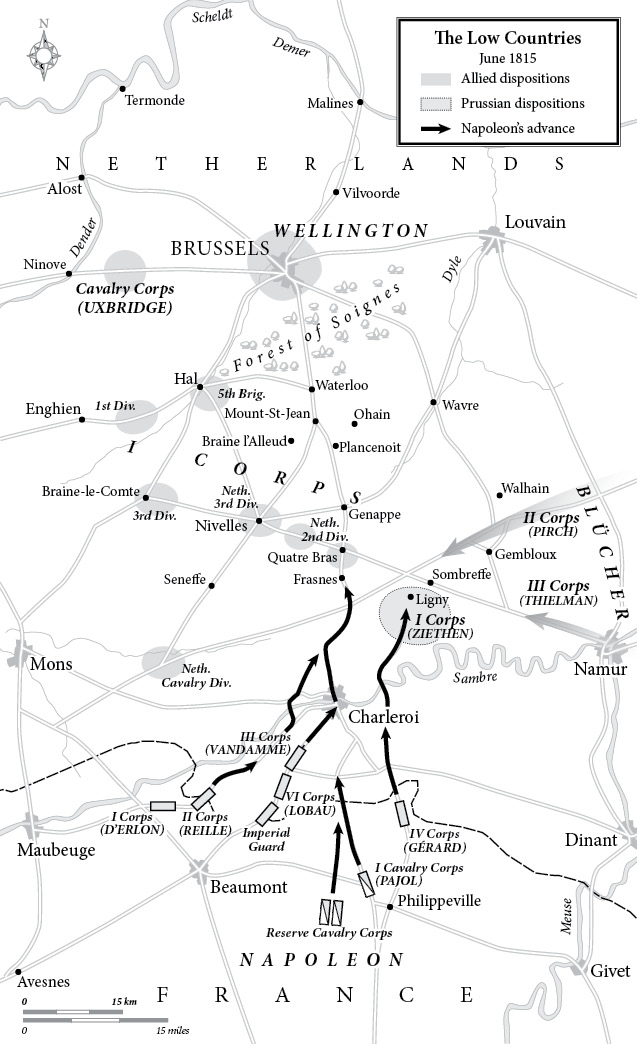
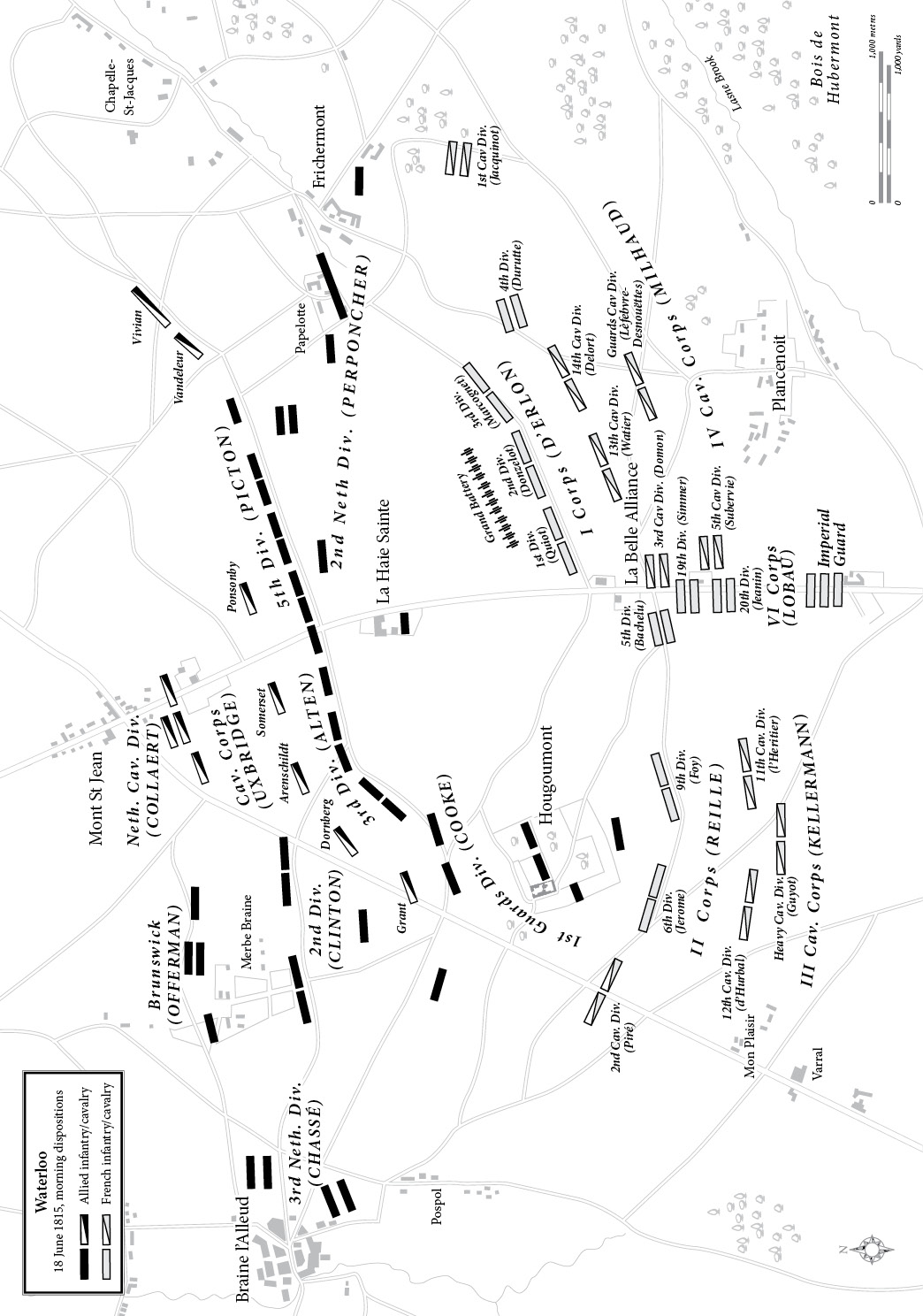
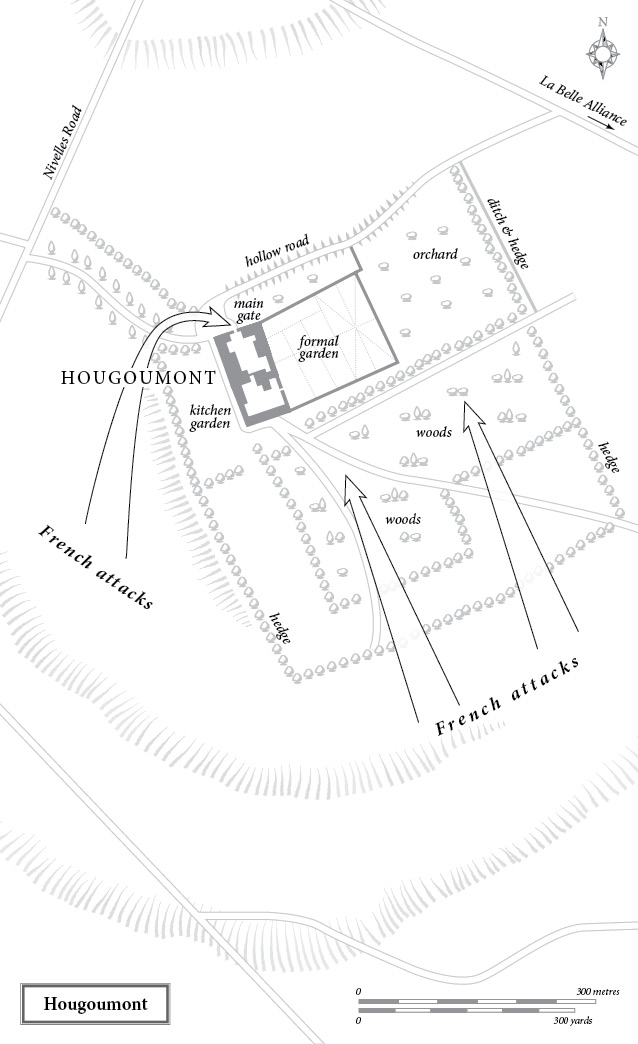
Prologue

‘There exists a highly respectable school of liberal thought which does not deplore Waterloo. We are not of their number. To us Waterloo is the date of the confounding of liberty.’
Victor Hugo, Les Misérables
On any Sunday or holiday around the end of the Napoleonic Wars, the naval pensioners of Greenwich Hospital, dressed in their tricorn hats and blue uniforms, could be found under a tree near the Observatory in the Park, their telescopes set up, their old yarns of Trafalgar and the Nile primed for retelling, waiting for trade. From the summit of the hill on which they stood the view stretched northwards over the marshes towards Barking church and Epping Forest, and westwards across a forest of masts and docks to the London of Wren, St Paul’s and Westminster Abbey.
It was a sight to make a foreigner quail at the trading might of a modern Tyre – there might be more than two thousand ships lying in the Thames at any one time – but for the Sunday holiday-makers who had made their way up Observatory Hill there was a more macabre demonstration of Britain’s naval power. For the last four hundred years crimes at sea had been punished with all the symbolic pomp the Admiralty could manage at Wapping’s Execution Dock, and for the price of a penny, the pensioners’ customers could hire a telescope and take their fill of the latest victims of naval justice, their bodies tarred and chained, and hanging in iron cages from a gibbet at the river’s edge as a warning against piracy.
On one such holiday in the early summer, while the hawthorn was still out and the great elms and chestnuts of Greenwich Park were looking their best, the humorist and poet Thomas Hood had paid his penny to see the sights and was sitting beneath the trees near the Observatory, watching the early-comers queue to take their turn. In almost every instance the first thing they asked to see were the ‘men in chains’ across the river on the Isle of Dogs, but there was one exception – a young woman he had watched climbing the hill on the arm of her husband, a swarthy-looking able-bodied seaman ‘with a new hat on his Saracen-looking head, a handkerchief full of apples in his left hand, with a bottle neck sticking out of his jacket for a nosegay’ – and it was this pair who caught Hood’s attention.
When it came to their turn, the sailor asked one of the ‘telescope-keepers’ to point out the men in chains for his ‘good lady’, but she told him that ‘she wanted to see something else first’.
‘Well!’ he wanted to know. ‘What is it you’d like better, you fool you?’
‘Why. I wants to see our house in the court, with the flowerpots, and if I don’t see that I won’t see nothing. What’s the men in chains to that? Give us an apple.’ There was nothing he could say that was going to change her mind, and while he consoled himself with his bottle she took an apple out of the bundle and told the pensioner to turn the telescope towards Limehouse church.
‘Here, Jack! Here it is, pots and all!’ she suddenly screamed. ‘And that’s our bedpost. I left the window up o’purpose as I might see it.’
Jack himself took an observation. ‘D’you see it, Jack?’
‘Yes.’
‘D’ye see the pots?’
‘Yes.’
‘And the bedpost?’
‘Ay, and here Sal, here, here’s the cat looking out of the window.’
‘Come away, let’s look again.’ And then she looked, and squalled, ‘Lord! What a sweet place it is!’ And then she assented to seeing the men in chains, giving Jack the first look.
Anyone familiar with Bruegel’s painting of the Fall of Icarus, with the labourers in the foreground pressing on with the ploughing, unconscious or utterly indifferent to the drama unfolding behind them, will hardly need the reminder but Thomas Hood’s Sal is still a useful warning about the way we see history. For all those nineteenth-century Britons who grew up with the memory of Waterloo, 18 June 1815 could only mean one thing, and yet for the men and women who lived through that day, carrying on their ordinary Sunday lives, going to Greenwich Park or church, oblivious to the fact that on the other side of the Channel the greatest single act of Sabbath breaking in British history was unfolding, it was a different story.
He didn’t think he would ever recover from this, a tragic Thomas Fremantle wrote in his diary after being bowled out for a duck in a school match at Eton, and it is this profoundly human mix of the extraordinary and the everyday, that gives the day of Waterloo its peculiar, haunting character. For two long weeks in the June of 1815 the country had been forced to live in that anxious limbo between events and report, and even as Wellington’s rain-sodden army was retreating towards Brussels for the final, decisive battle, men and women across the country were still going to the theatre and science lectures, still working in the fields and the factories, still reading and writing their sermons, still applauding the Duke of York’s winners at Ascot and buying their lottery tickets, blithely unconscious that there was such a place as Waterloo, or that the children who would be born that Sunday would be born into a different Britain from the Britain that for the last twenty years had struggled with Revolutionary and Napoleonic France.
I should like to have been able to say that this book was the story of Britain’s pots and cats and chained men on this, the most important day in its nineteenth-century history, but that might lead to the wrong expectations. This is not a social history of the kind that tells what people wore or the time at which they ate, but a book about the intersection of the private and public spheres, about the ways in which individuals are touched by remote events, and how much – or how little – of what we usually think of as mainstream history actually impinged on the lives of ordinary men and women who witnessed Waterloo.
‘And what should they know of England who only England know?’ Rudyard Kipling asked in the last heady days of Empire, and the same question might just as well be posed of the Britain that defeated Bonaparte. The Regency age carries with it such brilliant aristocratic and literary associations that it is very hard to look past them, but this was as much the age of the Highland Clearances and brutal misery as of Byron, Prinny, and Almacks, an age of such violent cultural, intellectual and economic extremes and contrasts that it is difficult to believe that the events described here took place in the same century let alone the same country.
This is a book about that country, the Britain that fought Waterloo and the very different Britain that emerged triumphant from it, and if it says more about the casualties of victory than it does about its rewards then that is because the latter hardly need spelling out. For another hundred years the country would bask in the rich afterglow of victory, and yet while successive generations could grow up with the comforting assurance of God’s special dispensation for his chosen people, there was another Britain – the Britain of the prison and the poorhouse glimpsed here through the smoke of battle and the burgeoning mythology of Waterloo – that would never see the fruits of a war that had framed, blighted or ended their obscure lives.
This is the unique fascination of Waterloo, the chance it gives to see the country at that crucial moment in its history, fixed in all its trivial and mundane detail in the diaries, newspapers and letters of the time as firmly as Pompeii in the ash of Vesuvius. In the aftermath of the battle, Britain might enjoy prestige and power of a kind it had never known before; but if one could go back a day or even hours, if one could just go back to the Saturday evening of 17 June, to the Britain that ‘Mr Stevenson, engineer’ had buried in a time capsule at the opening of the new lighthouse at the Point of Caswell that morning – to a Britain that did not know it was going to win – did not know that the ‘Age of Waterloo’ was starting – a Britain that was no more united than the Edwardian Britain that would rush to war a hundred years later, what kind of country would we see?
I have begun the story of that night at the London home of Charles and Mary Lamb, where the fragile crust that separated Regency civilisation from brutal reality was at its thinnest, because their story is, in miniature, the story of the age itself. What lay behind the stuccoed elegance of Nash’s facades or the dazzling swank of Lawrence’s portraits on show at the Royal Academy this Saturday? What irresistible pressures for change were building up behind the matchless beauty and numinous historical resonance of England’s landscape? What would you have seen, if you could have looked through that telescope at Greenwich? Which lives, which stories unfolding that night, carried with them in some embryonic form the suggestion of the future?
And, finally, what was the Britain like that was in part created out of the mythology of Waterloo? For the men who fought it and the families who grieved it was a fight for freedom but for a great swathe of radical Britain it was the death knell of all their hopes. Which was it? Was Hugo, speaking as much as a liberal as a Frenchman, right? Or could the soldiers who fell along the Mont-Saint-Jean ridge at Waterloo die with the same confidence in their cause as their successors in Flanders a century later? The object of this book is to tell the story of that day and open out these questions. It shifts hour by hour, between Britain and Belgium, prison and palace, poet and pauper, though a warning note should be added to the timeframe of the events described. There are specific times here that we know from journals or memoirs or written orders, but how accurate they are is impossible to say. In Britain there would be no standardised time until the coming of the railways in the middle of the century – there might be anything up to twenty minutes difference between local mean time and Greenwich Mean Time – and when it comes to Belgium nobody can agree even so far as the time the battle began. Some contemporary accounts give it as early as nine in the morning, some recent historians as late as one in the afternoon. British officers’ watches would probably still be on London time, which explains why British accounts of the battle tend to place events earlier than French sources, but even within the allied ranks there was no synchronisation of watches that might narrow the gap. I have placed it – out of probability as well as narrative convenience – late in the morning as most of Britain was going to church and Sal and her tar were fondly looking at their cat.
PART I

The Tiger is Out

‘The pilot who is carrying us into Liverpool, told us of Bonaparte’s return to Paris … Even in this age of tremendous revolutions, we have had none so appalling as this … When Napoleon was rejected from France, every man in Christendom, of honest principle and feelings, felt as if a weight of danger had been lifted from his prospects – as if he had a surer hope of going down to his grave in peace and leaving an inheritance to his children. But now the whole complexion of the world is changed again … God only can foresee the consequences.’
George Ticknor, 11 May 1815
In the early hours of 7 March 1815, the representatives of the five Great Powers meeting at Vienna to deliberate the future of post-Napoleonic Europe wearily adjourned the latest round of discussions. They had not solved the tricky problem of what to do with the king or the Kingdom of Saxony, but as they went to bed that night, they could, by and large, feel fairly satisfied with what they had done.
There were still outstanding issues and open sores – in Germany, in Italy, in Switzerland, with the Catholic Church, with disgruntled minor sovereigns and bitterly disappointed liberals and patriots – but if nobody had everything they wanted, nobody either had gone to war. Over the past six months there had been any number of potential flashpoints that might easily have led to bloodshed, but with an inimitable mixture of diplomacy, frivolity and old-fashioned horse-trading that marked the Congress of Vienna, Bourbon France had again been integrated into the brotherhood of civilised nations, Prussian and Russian territorial ambitions accommodated, British concerns over the Low Countries met and the principle of legitimacy – tempered with a brutal streak of realpolitik – firmly reasserted without recourse to arms. ‘May security, confidence and hope revive everywhere,’ read a draft declaration drawn up by the British, ‘and with them peaceful labour, progress in industry, and prosperity, both public and private! May sombre anxiety for the future not awaken or bring back the evils whose return the sovereigns would wish to prevent and whose last trace they would like to efface! May religious feeling, respect for established authority, obedience to the law and horror of everything that might disturb public order once again become the indissoluble ties of civil and political society! May fraternal relations, mutually useful and beneficent, be re-established between all lands! … And may homage at last be rendered to that eternal principle that there can be for nations as for individuals no real happiness but in the prosperity of all!’
It was an idealistic, if improbable dream – disinterest had been remarkable by its absence from the Congress – and even as the tired plenipotentiaries made their way to their beds or their mistresses on the morning of the 7th, couriers were on their way to Vienna to tell them the dream was over. At six that same morning the Austrian Foreign Secretary Count Metternich was woken by his valet with a despatch from Genoa marked ‘Urgent’, and within hours the whole of Vienna knew the worst: Napoleon Bonaparte, exiled by the allied powers to the island of Elba just eleven months earlier, had ‘disappeared’.
Neither the Austrian consul in Genoa nor the British representative in Florence had any idea where he was gone, but the money at Vienna was on Italy. In the rearrangement of Europe, Napoleon’s old marshal Joachim Murat had somehow clung on to the throne of Naples, but as British frigates desperately scoured the Mediterranean for some sign of the Great Disturber, Bonaparte himself, along with the small force of his old Imperial Guardsmen and Polish lancers that had been permitted him in his island exile, was landing on the French coast to reclaim his crown.
The ‘Tiger’, as the great portrait painter Sir Thomas Lawrence, with a Blake-like mix of awe and fear had called him, was again loose and when two days after Vienna the news reached Britain the country was swept up in a storm of excitement, speculation and fear. ‘What times we are living in,’ the ageing, half-cracked Mrs Piozzi – Dr Johnson’s Hester Thrale – wrote from Bath, a city, like some Regency Gomorrah, desperately searching Revelations to learn of its impending fate. ‘The events come forward as Scripture says they will do, like Pangs of Parturition; every Pain sharper than the last … I was a sad Blockhead to leave Faber’s Books upon the Prophecies behind me … they are so sought after now … While Buonaparte remained on Elba nobody thought of them: it must be very gratifying to the Author – That He should be immediately looked up to when all the Folks are wondering, and thinking What will come next? What will come next?’
It was a question that was being asked across the country, and for all the reliable intelligence that anyone had one that was as likely to be answered in Revelations as it was anywhere else. The first reports of Napoleon’s escape had not reached London until 9 March, and by then the news was more than ten days out of date and the desperate ‘adventurer’ who had landed near Antibes with barely a thousand men was already halfway to Paris and, ‘God knows how, and in the twinkling of an eye’, as The Champion’s editor, John Scott, reported from France, ‘up again and in all his meteor-like intensity shaking from his “horrid hair” portentous flashings over the astounded world’.
Antibes, Grasse, Castellane, Grenoble, Lyons – a man would need ‘the wings of a demon’ to keep pace with his progress, the Edinburgh Courier told its alarmed readers. No sooner had one shock been absorbed than there was another to face. On 7 March, Lord Fitzroy Somerset had written from Paris that there was nothing to fear for himself or his pregnant wife, but by the time the letter reached his brother in England the ‘monster’ that Marshal Ney had vowed to bring back in a cage was again emperor in his old capital and Louis XVIII once more on his way into exile.
‘What a dreadful prospect is thus suddenly opened to mankind! What dismay must not these tidings strike into the hearts of hundreds of thousands of human beings in every station of life,’ the great reforming lawyer, Sir Samuel Romilly, had written in his diary, and yet even as London held its breath and hoped, Europe was already mobilising for war. ‘Napoleon Bonaparte, by again appearing in France with projects of confusion and disorder,’ the Congress of Sovereigns famously declared, ‘has deprived himself of the protection of the law, and in consequence has placed himself without the pale of civil and social relations; and, as an enemy and disturber of the tranquillity of the world, has rendered himself liable to public vengeance.’
After less than a year of quiet, Europe was again in arms, and as the sovereigns at Vienna returned Napoleon’s protestations of peace unanswered, and the Duke of Wellington left the Austrian capital for Brussels to take command of the allied army in the Low Countries, a bewildered Britain took stock of the new reality. For more than twenty wearying years it had been at war with either Revolutionary or Napoleonic France, and for half the population those few delusory months sandwiched between Napoleon’s abdication and escape were virtually the only peace they had ever known.
For as long as many could remember the aspirations and hopes of a whole nation had effectively been put on hold. In terms of battlefield deaths the British Army would lose more lives on a single day in 1916 than it had in these twenty years combined, but by any other measure than a butcher’s bill it had been a ‘total war’, consuming the energies and talents of the whole country, changing the land and shrinking distances, stifling reform and reaching into every facet of life in a military and economic struggle that had left Britain with the undisputed command of the world’s trade, a national debt of £861 million, one in five of the population on the poor rates, and a whole thwarted generation longing for political change. ‘In 1814 a war which had lasted so long that war seemed our natural state was felt to be over,’ wrote the Edinburgh lawyer, Henry Cockburn, recalling the sense of a new beginning that Napoleon’s exile just eleven short months earlier had seemed to promise; ‘from this moment the appearance of everything was changed. Fear of invasion, contempt of economy, the glory of our arms, the propriety of suppressing every murmur at any home abuse, the utter absorption of every feeling in the duty of warlike union – these, and other principles, which for twenty years had sunk the whole morality of patriotism in the single object of acknowledging no defect or grievance in our own system, in order that we might be more powerful abroad, became all inapplicable to existing things.’



